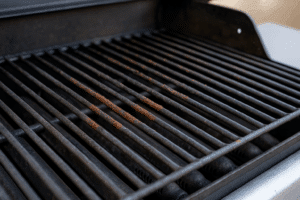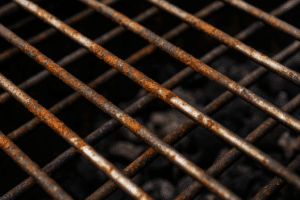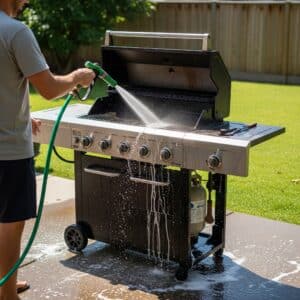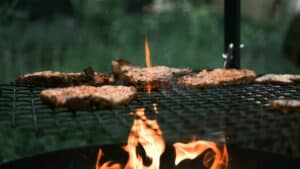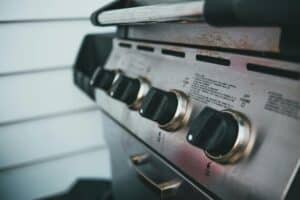Introduction
If you’ve ever stared at a dirty grill and wondered what the best way to clean it is, you’re not alone. With so many tools and cleaning products on the market, it’s easy to feel overwhelmed — or worse, to use the wrong thing and end up damaging your grates. Some cleaners can leave toxic residue, while certain brushes can scratch or even shed bristles that wind up in your food.
The good news is that you don’t need an arsenal of fancy products to keep your grill in great shape. A few reliable tools, a couple of safe household cleaners, and the right technique will handle most situations. And if your grill is past the point of DIY, there are professional services that can restore it without risk.
This guide covers the best tools, natural cleaners, and specialty products you can safely use on your grill — and just as importantly, what to avoid.
Grill Cleaning Tools: The Basics
Before you start spraying or scrubbing, the right tools make all the difference. A good cleaning tool should be tough enough to clean through grease and carbon buildup, but gentle enough not to scratch or damage your grates.
Grill brushes
- Stainless steel bristles work well for uncoated cast iron or stainless steel grates. They cut through carbon easily but can be too harsh for delicate surfaces.
- Brass bristles are softer and a safer choice for porcelain-coated grates. They won’t scratch the surface as easily, though they wear out faster.
- Nylon brushes are gentle but should only be used on a completely cool grill. Heat will melt the bristles and render them useless.
Grill cleaning bricks or pumice stones
These abrasive blocks are especially effective for heavy carbon buildup. They mold to the shape of your grate as you scrub, which helps cover more surface area. They’re safe for cast iron and stainless steel, but not recommended for coated grates.
Scrapers and pads
Simple scrapers (metal or wood) can be very effective for loosening stuck-on debris. For a more gentle option, heavy-duty scouring pads work well with a bit of hot water or a natural cleaner.
The key is to choose the right combination based on your grill’s material. Using a stainless steel brush on porcelain, for example, can quickly lead to chips and rust.
Natural and Household Cleaners
Sometimes the best cleaning solutions are the ones you already have in your kitchen. Natural cleaners are safe, affordable, and effective when used correctly.
Vinegar
White vinegar is excellent for breaking down grease and loosening light rust. Mix it 50/50 with water in a spray bottle, apply it to warm (not hot) grates, and let it sit for a few minutes before scrubbing.
Lemon juice
Similar to vinegar, lemon juice provides mild acidity that can cut through grease. It’s especially effective when combined with salt as a gentle abrasive.
Baking soda
For stubborn spots, mix baking soda with a little water to form a paste. Apply it directly to the problem area, let it sit, and then scrub with a scouring pad.
Dish soap and hot water
Mild dish soap works well for soaking removable parts like grates, drip trays, and flavorizer bars. Be sure to rinse and dry completely to avoid leaving behind residue or moisture that could cause rust.
What to avoid
Harsh oven cleaners, bleach, or strong degreasers designed for industrial use should never be applied to grill surfaces. They can leave toxic residues that seep into food the next time you cook.
Specialty Grill Cleaning Products
There are products designed specifically for grills, and some can make life easier when natural methods aren’t enough.
Grill sprays and degreasers
Food-safe grill cleaners can help when you’re dealing with baked-on grease. Always check the label to make sure they’re non-toxic and safe for your grill’s material. If you’re unsure, stick with natural options.
Steam cleaning
Steam is one of the most effective and safest ways to clean a grill. It removes grease, sanitizes surfaces, and doesn’t require harsh chemicals. You can buy small steam cleaners for home use, but they may not be powerful enough for deep buildup. That’s where professional services come in. Fire & Metal offers steam cleaning for grills that reaches every component without risking damage.
Grill-safe polish
For stainless steel exteriors, a polish designed for grills can keep surfaces shiny and fingerprint-free. While this is optional, it helps maintain appearance and adds a layer of protection.
What Not to Use on a Grill
Not every cleaning method you see online is safe for your grill. Some can cause long-term damage, while others are unsafe for food contact.
Wire brushes that shed bristles
Cheap grill brushes can lose bristles during use. Those bristles can stick to grates and end up in food — which is a serious health hazard. If you use a wire brush, inspect your grates carefully afterward.
Toxic chemical cleaners
Products like bleach, ammonia, or heavy-duty oven cleaners can leave behind residues that don’t fully burn off. The next time you cook, those chemicals can transfer to your food. Stick with food-safe options only.
High-pressure power washers
Blasting your grill might seem like a quick fix, but it can drive water and grease into sensitive areas like burners, ignition systems, and gas lines. This often causes rust, clogs, or costly repairs down the line.
Steel wool on coated grates
While steel wool can strip rust from bare cast iron, it will destroy porcelain or enamel coatings. Once that protective layer is gone, rust will form much faster.
Professional Alternatives
Sometimes the safest way to clean your grill is to let the pros handle it. Professional services use specialized equipment and food-safe cleaners designed for grills, which means no risk of damaging coatings, burners, or ignition systems.
At Fire & Metal, we specialize in cleaning grills using a method that sanitizes, strips grease, and restores your cooking surfaces without harsh chemicals. It’s thorough enough to reach the firebox, burners, and other areas that DIY methods often miss, giving your grill a fresh start.
For homeowners in the Bay Area, this can be the difference between a grill that just “looks better” and one that’s actually safe and ready to perform like new.
Conclusion
The tools and products you choose for grill cleaning make a big difference. The right brush or pad, paired with safe household cleaners like vinegar or baking soda, can handle most day-to-day buildup. Specialty cleaners and steam can help when grease gets stubborn, but avoiding unsafe methods is just as important.
TL;DR: Stick with food-safe tools, avoid harsh chemicals and cheap wire brushes, and clean consistently to prevent big problems down the road. If your grill is beyond what a brush and vinegar can fix, professional steam cleaning is the safest way to restore it.
Ready for a deeper clean? Fire & Metal offers professional grill cleaning across the Bay Area to keep your equipment safe, sanitary, and working like new.

